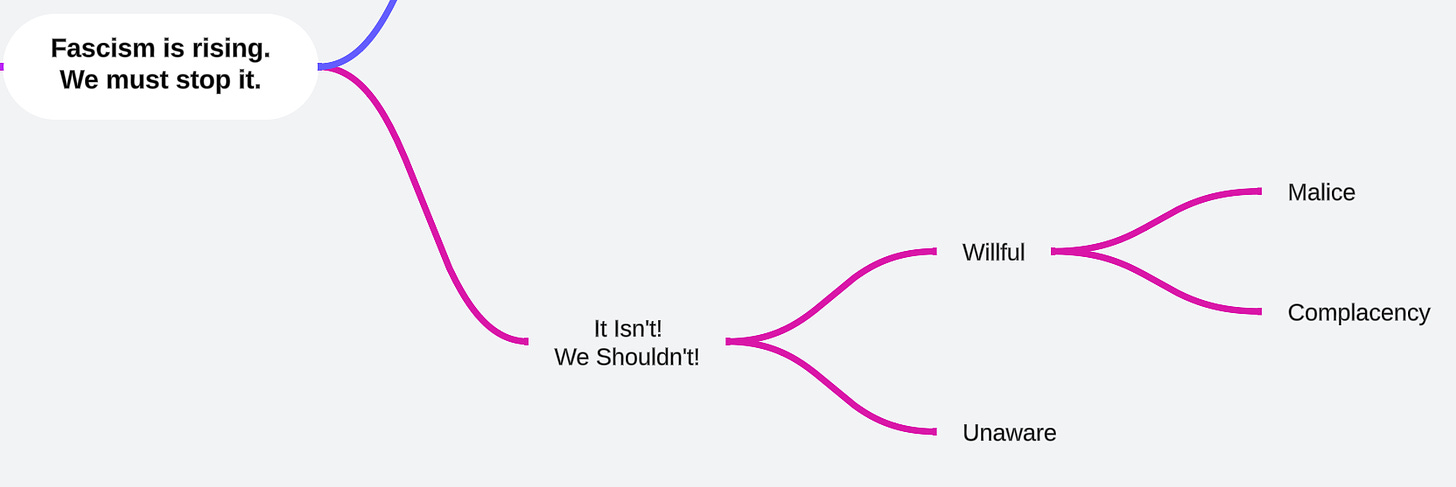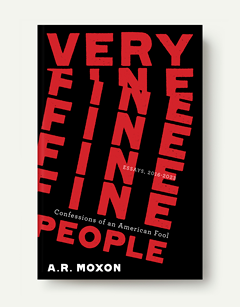Margins of Permission
Some examples of the multifaceted gem that is supremacist bad faith. Margins of Permission (2 of 3).

This is an essay I broke into three parts. This is part two. Here’s part one if you missed it. Part 3 will drop tomorrow. And away we go.
Like I said last time, I’ve been examining bad-faith tactics. This is a bit of a side-trip on a larger examination of the DARVO (deny, accuse, reverse victim and offender) bully tactics of narcissistic abusers, which are used so effectively by abusers in order to create the sort of false equivalencies that allow them to continue and escalate their abuses, and which are used by the narcissistic abusive spirit of supremacy in the United States to promote and escalate fascism and authoritarianism and their abuses, as well as to actualize supremacy’s end goal, which is the elimination of people who supremacy has already marginalized and abused and used and discarded.
It’s the sort of thing that, once you’re in the thick of it, seems to have no end. Hopefully I’ve kept it interesting along the way, but there are seemingly infinite permutations. I even began relaying a taxonomy of bad faith. I charted it and everything.
Now I’d like to finish it.
I started with a premise based on the observable reality that fascism is rising, and the moral reality that fascism is unacceptable and must be stopped.
Then I explored the various instances of bad faith you can find coming from those taking the negative position, which I positioned as the lower road of my taxonomy.

Sometimes supremacists will seek debate from a place of honest malice, saying “the quiet part loud,” but more often they will act in bad faith, hiding among the unaware with a pretended unawareness, or pretending among the complacent with a feigned indifference.
It’s the unaware and complacent majorities who supremacists most want to capture, incidentally, and they know that being allowed to debate their supremacist assumptions and eliminationist ends will help them do that, by putting them on a platform and offering them as an available option. So my prescription was to lose the debate—not in the sense of wins and losses, but in the sense of casting it off—in order to use tools of witness and information and moral clarity, which engage supremacist bad faith without normalizing its premises and sharpening the rhetoric of its adherents.
Now I want to look at the upper road—the high road, we might be tempted to say.
But first I want to talk about a few related things that I think illustrate why bad faith is so necessary and effective for supremacists.

I’m publishing a book of essays called Very Fine People: Confessions of an American Fool, and my readership is helping me do that. If you want the details on how you can get in on that and get a signed copy and my thanks in the acknowledgements section of the book, click this link.
The first thing is an exposé in The New York Times of the self-proclaimed “anti-woke” movement, and the ways it went about acting in opposition to diversity, inclusion, and equity programs in America. Their communications and goals essentially reduce to traditional pro-discrimination and segregationist sentiment, and represent an engaged, empowered, and organized effort to protect and expand structural racism, sexism, and other bigotries—an effort that its organizers clearly planned to frame as acting in the spirit of combatting bigotries, in a plot of deliberate bad faith to popularize opinions they knew were unpopular.
This is alarming stuff (I’d really encourage you to read it; it’s important to see what fascists actually think when they aren’t trying to pretend to be concerned with the sort of things decent human beings are concerned with) but also kind of standard. We already know supremacists intend supremacy, and are willing to act in infinite bad faith to achieve it.
What’s interesting to me is that these (mostly) white (mostly) men, who are actually in favor of bigotry and know it, have to pretend to be opposed to it while they figure out how to expand the margins of permission so they no longer have to pretend.
This tells me that having to pretend actually hurts them, because it means that the margins of permission have been curtailed by an opposing campaign of awareness. Genuinely unaware or confused people have at least become aware that bigotry is bad, and genuinely complacent people have learned that being seen as a bigot will bear a social cost, and social costs are something complacent people want nothing to do with, and so, in many ways, open bigotry has been taken off the table for bigots.
These anti-woke supremacists didn’t used to have to pretend, is the thing. You used to just be able to say your bigotry out loud, much more than you can even now. Not that long ago, really; in my own lifetime—and like I said, I’m in my forties. Go back 10 or 20 more years than that, and people could be positively flagrant and wear white sheets and burn crosses and murder people at Sunday picnics and be considered pillars of the community not despite it but because of it.
Over the decades, something changed. And, like any bully, these anti-woke supremacists knew where the margins of permission regarding abuse and violence have been set, and where they have moved, and they now know they will need to lie about their beliefs and intentions in order to create the false equivalencies necessary to expand those margins again.
They’re going to need to hide their intention to eliminate undesirable types of people in the trappings of freedom and openness and inclusion.
And they’re going to need Poochies to cover for them, by finding their lies understandable.
The next thing I want to mention is a profile, again in the Times, of a young Black conservative man named Coleman Hughes who has an anti-woke book coming out. Hughes believes in a color-blind society, which is also what anti-woke white conservatives (like the ones in the previous story) say they believe in. He believes that focusing on effects of race within society creates more racism, not less, which is also what anti-woke white conservatives say they believe. In defense of a colorblind society, he uses the exact same Dr. Martin Luther King Jr. quote that white conservatives use in defense of a colorblind society, the one about how children “will not be judged by the color of their skin but by the content of their character.” This is a framing of Dr. King’s quote that always misses the fact that King was not talking about children in general, but his own children, who in fact were judged by the color of their skin rather than the content of their character, and still are in many ways. It is a framing of Dr. King’s quote that excises the context of the larger speech, a full reading of which will show that Dr. King was expressing his vision as a dream specifically because of all the ways it wasn’t real; and making a powerful case that in order to make the dream real there would need to be some hard conversations about race, and a general campaign of awareness of the structural nature of racism and injustice in the United States, and an active persistent program to combat it by promoting diversity, inclusion, and equality.
Read the speech sometime; I have. It’s woke. It’s very woke.
Anyway, Hughes has a book coming out, and as a Black man he knows a lot more about being Black in this country than I do, so I have no interest in interrogating the path by which he arrived at his conclusions or his motives or intent as regards racism in the U.S. But I will point out that the market for this sort of thing appears to be the sort of people who find that sort of thing appealing, and since I know a lot more about the instinct for self-exoneration among people who deem themselves “white” than I do about being Black in the U.S., I actually feel pretty comfortable questioning the motives and intents of the anti-woke white people who seek anti-woke Black voices to cover their entire supremacist anti-woke project with a sort of exonerating blanket of pro-Blackness.
Whatever his intentions, and whatever his ultimate rhetorical goals, Coleman Hughes has come to believe in many of the same narratives as white conservatives, people who we know for a fact are promoting such rhetoric in bad faith to defend and promote bigotry, and this has made Hughes popular with the white anti-woke movement. Maybe I could learn something from Hughes by reading his book, but the NYT profile doesn’t leave me optimistic. His perspective as conveyed doesn’t seem new and fresh. It seems to me very old and familiar, a narrative that reassures me the fight against injustice will ask nothing of me.
It all seems to me like an attempt to expand the margins of permission.
I think this may be somebody whose perspective will be very attractive to my Poochie, or any Poochie.
Finally (and I’m sorry) I want to talk about Charlie Kirk. Kirk is a mainstream conservative in right-wing media, which is to say he’s a supremacist fascist, and a fairly open one, these days. He sits a bit on the edge of the mainstream fascist map, though, and from there he works in the way of any bully to test and extend the margins of permission as regards abusive violence.
Kirk has long claimed to revere Dr. King, and, like Coleman Hughes, he has pointed frequently in the past to Dr. King’s quote, the one where Dr. King said he dreamed that some day his children would not be judged by the color of their skin but by the content of their character. And, like most white conservatives who claim to revere Dr. King, Kirk has invariably stripped that quote from its context, and interpreted it to mean “talking in any way about race is racist,” and hoping we don’t notice that there’s not many ways of defending and promoting racism more effective than making racism harder to talk about. Charlie Kirk claims to revere a heroic man who infuriated men like Charlie Kirk by refusing to make the humanity of Black people a question of debate, and by insisting on having hard conversations about race that men like Charlie Kirk did not want to have, and he was despised by men like Charlie Kirk until he was murdered by a man like Charlie Kirk, an act which all the Charliekirks of yesteryear celebrated.
Anyway, on January 15, Charlie Kirk changed his pro-King tune. He ran a program hostile to Dr. King and his legacy and the way King is celebrated today. He put out a tweet promoting the show that read “Who was MLK? A myth has been created and it has grown totally out of control. While he was alive most people disliked him, yet today he is the most honored, worshipped, even deified person of the 20th century. Today we are going to tell the truth and explain how this myth was born. Happy Monday.”
The Monday in question was Martin Luther King Jr.’s birthday, by the way. That’s right, Charlie Kirk, who long claimed to revere Dr. King, chose King’s birthday as the occasion to launch a posthumous broadside against King and his legacy.
Apparently Charlie Kirk now believes that pretending to revere Dr. King is less useful in the effort to defend and promote supremacy than it used to be. He appears to find it more useful to the defense and promotion of supremacy and its eliminationist goals to take the posture that the Charlie Kirks of Dr. King’s day took toward King, which was to honestly and openly despise him.
Something’s changed.
I think what’s changed is the margins of permission, and that Charlie Kirk, who, like any bully has a finely tuned sense of where those margins are, knows it.
It used to be a common narrative to hate King—people were very vocal about it. Now it’s not a common narrative. If you are like Charlie Kirk, and you very much want to oppose civil rights and the movement for justice, you had to do all that while pretending to be in favor of civil rights and justice. Now, in his function as a mainstream conservative (which is to say fascist) permission-expander, he thinks he can step his toe back over that line and move the margins out. He thinks that he can publicly craft an anti-King narrative, which would be useful in crafting an anti-civil-rights narrative, which would be useful in demolishing what is left of civil rights in this country, which would be useful in eliminating elements that are undesirable to Republicans and other types of supremacists, which is what Charlie Kirk wants to do.
So he’s going to try it. Run it up the old flagpole along with the new white supremacy flag, the one with the thin blue line, and see who salutes. And how they salute.
If they salute, then it’s the new narrative, and the margins of permission have moved back out, and it will be that much easier to be openly opposed to civil rights. And if nobody goes for it, he’ll have been kidding, or misunderstood, or misquoted, or something.
Either way, he’s going to need a Poochie to find it all understandable.
But now, let’s return, at last, to our taxonomy of bad faith; our chart of the possible positions a bad faith actor with eliminationist intentions might take.
Let’s return to the upper road.
Part 3 tomorrow morning.
The Reframe is supported financially by about 5% of readers.
If you liked what you read, and only if you can afford to, please consider becoming a paid sponsor.
Click the buttons for details.
Looking for a tip jar but don't want to subscribe?
Venmo is here and Paypal is here.
A.R. Moxon is the author of The Revisionaries, which is available in most of the usual places, and some of the unusual places, and the upcoming essay collection Very Fine People, which you can learn about how to support right here. He is also co-writer of Sugar Maple, a musical fiction podcast from Osiris Media which goes in your ears. He even gave you some of his special donuts for free.




Comments ()